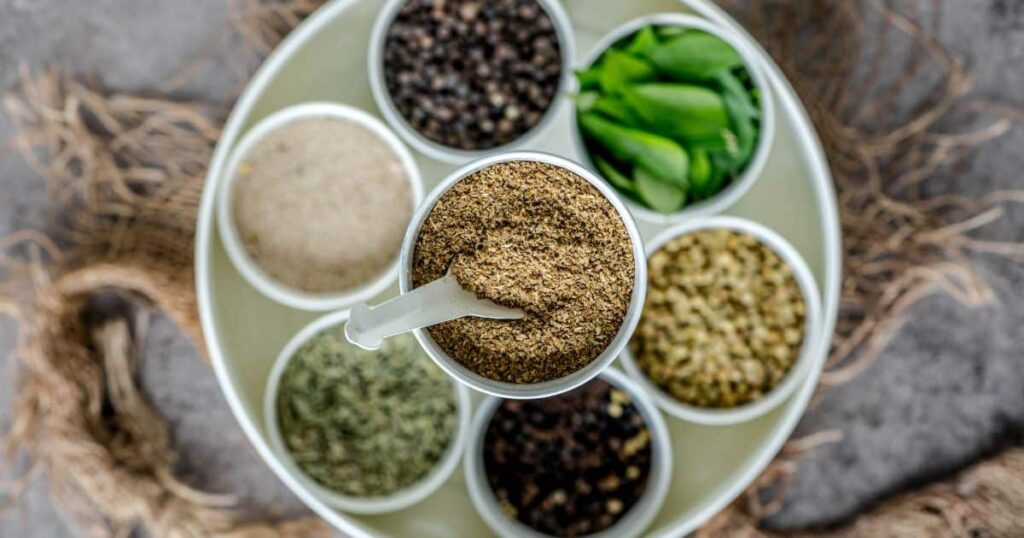Dhaniya seeds are widely available at most leading grocery stores, both online and offline. However, for better freshness and value for money, I recommend visiting an Indian or Asian grocery store, where you can buy them in bulk at a more affordable price.
Look for crisp, aromatic, and good-quality organic whole coriander seeds—they should be golden-brown, not dull or shriveled. High-quality seeds will give you the best flavor and aroma when making homemade roasted coriander powder.
Yes, you can roast them in the microwave or oven if you prefer. For the microwave method, spread the seeds evenly on a microwave-safe plate and heat in 30-second intervals for about 3 minutes, stirring in between until they become aromatic.
To roast in the oven, preheat it to 325°F (160°C) and spread the seeds in a single layer on a dry baking tray. Roast for a few minutes until they turn slightly darker and release a strong aroma.
That said, the stovetop method remains the most efficient and traditional way to roast dhaniya seeds evenly. You can also sun-dry them for a few days, just like our grandmothers used to, especially in warmer climates.
Be careful not to burn the dhaniya seeds while roasting. If you overdo it, the dhania seeds will become dark brown and alter color of the spice blend and make it bitter. Always roast them on a low to medium flame and stir continuously to ensure even roasting. Once done, immediately transfer the seeds to a plate—do not leave them in the hot pan, even if the heat is turned off. The residual heat can continue cooking the seeds and may burn them.
To keep your homemade powdered dhaniya fresh and aromatic for as long as possible, store it in a clean, dry, airtight container. Using a small kitchen funnel makes transferring your ground coriander powder into storage jars easier and less messy. You can keep it on its own or mix it with cumin powder to make dhaniya-jeera powder, depending on your cooking preferences.
While whole dhaniya seeds can be stored in the freezer for up to 3 years, ground coriander has a shorter shelf life—typically 4 to 6 months. Avoid storing small quantities of ground spices in the refrigerator or freezer, as frequent opening may introduce moisture and humidity, which reduces freshness.
If you’re storing dhaniya powder long-term, you can keep it double-bagged in the freezer to retain its flavor and prevent insects from getting in. However, the best method is to keep it in a cool, dark place, away from direct sunlight, humidity, or heat. Use glass jars or spice containers with tight-fitting lids to lock in the flavor and aroma.
Always use dry spoons when scooping dhaniya powder from the container. Moisture can cause the spice to clump, lose its aroma faster, and even lead to spoilage.
If you’re out of dhaniya powder, you can use cumin powder as a substitute. While the flavor profiles are different—cumin is earthier and more pungent, whereas dhaniya is citrusy and mild—they often work well together in Indian cooking and can stand in for each other in a pinch.
Keep in mind, this won’t be an exact replacement, but it will still add depth to your dish. You can also experiment by adding other whole spices like caraway seeds, cloves, curry leaves, fennel seeds, poppy seeds, or bay leaves to your spice blends for a more complex flavor. These additions don’t need to be roasted, especially if you’re just looking to enhance the aroma subtly.
Since dhaniya seeds have a light citrus note, a pinch of lemon zest can aslo help replicate the flavor.
However, for the true aroma and flavor that coriander powder brings—especially in Indian curries and spice mixes—there’s really nothing quite like the real thing!
Fresh cilantro leaves, however, is not a suitable substitute for ground sookha dhaniya. Even though they come from the same plant, their flavor profiles are entirely different—cilantro is fresh, herbal, and slightly tangy, while powdered coriander is warm, nutty, and mellow.
It’s easy to know when dhaniya powder has lost its potency or gone bad. If the spice mix appears lumpy, overly powdery, or has tiny insects in it, it’s definitely time to discard it. Another clear sign is the lack of aroma—fresh dhania powder should have a distinct citrusy-earthy fragrance. If there’s no scent at all, it’s best to toss it and make a fresh batch for optimal flavor and safety.

